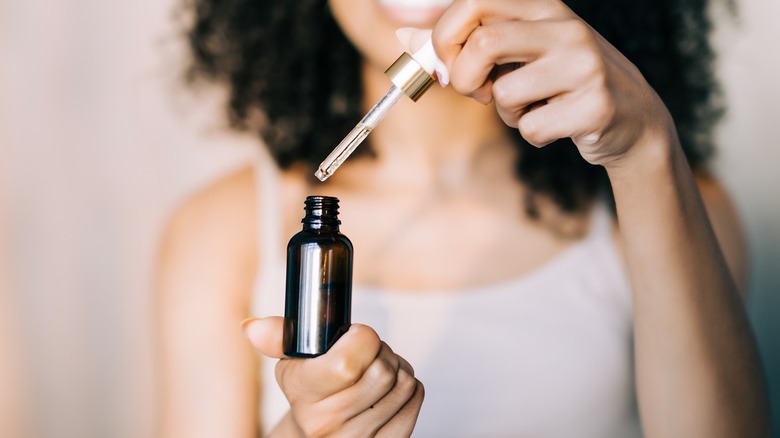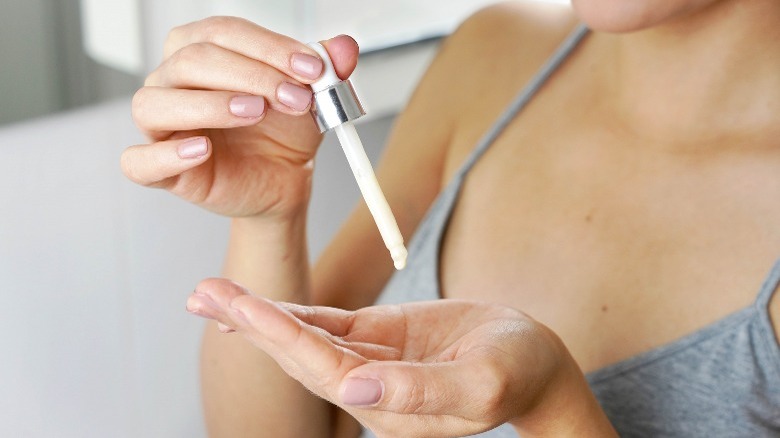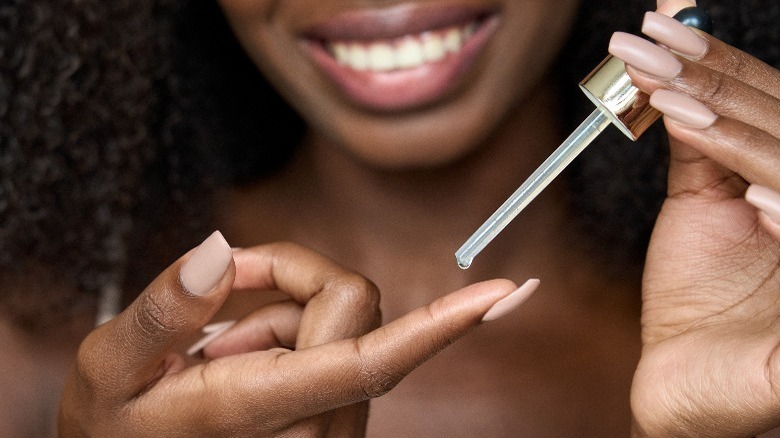Oil And Water Are Key Components Of Your Skincare Routine (Yep, You Heard Us)
When a friend tells you that she and her most recent date got along "like oil and water," we understand that to be a bad thing. Oil and water, as we know, do not mix; rather, each slides around the other, unable to connect. Despite their nature to separate, oil and water are both needed components when it comes to taking care of your skin's needs, namely to ensure that your skin stays hydrated. And this is true despite what you might have heard about how each interacts with your skin type. But first, it's crucial to understand how oil and water work with your skin, to ensure that you are maximizing the benefits of each.
Making up the vast majority of our skin, the dermis is where oil and water work together. The dermis is responsible for the skin's oil production, and it's also largely responsible for maintaining the skin's water supply. The oil and water in the dermis both need each other to function. When dehydrated, your water supply is depleted and might trigger the dermis to compensate by making more oil. But having dry skin is considered a skin type, where it is lacking in the oils needed to properly lubricate the skin on a structural level. These are two problems with two separate solutions. But because of their interconnected relationship, oil and water-based products should both be included as essential components of your skincare routine. Here's how to ensure that happens.
Water-based skincare hydrates
While most of the water in our skin is absorbed from the inside, topical products can assist in rehydrating your skin from the outside. One critical distinction between water and oil is that water is solely responsible for the skin's hydration. Instead, oil seals in the skin's hydration, making it last longer. For this reason, choosing water-based skincare products is a must when you're looking to restore hydration to the skin.
While it can be challenging to sift through the vast and often misleading lexicon of skincare marketing terms, familiarizing yourself with the three main types of skincare ingredients, emollients, humectants, and occlusives, can be clarifying. When it comes to addressing dehydrated skin, humectants are what you're looking for. These are ingredients that attract water, both from inside the body and from your external environment, to rehydrate the skin. One well-loved humectant is hyaluronic acid, which is also produced within the body. This acid is known to hold many times its weight in water, making it an extremely strong and effective hydrating ingredient. And, it can be found in tons of cleansers and moisturizers, meaning that your skincare routine probably doesn't need a hyaluronic acid serum. But underneath the humectant umbrella are many other ingredients that can serve even more specific skincare needs. Alpha hydroxy acids and beta hydroxy acids, often referred to as AHAs and BHAs, are also known humectants, in addition to being worthy exfoliators. This means that you can exfoliate your skin, while also restoring some hydration at the same time. We love to multitask!
Oil-based skincare moisturizes
Addressing dry skin is where oil-based skincare products come into play. Once your skin is properly hydrated, you want to make sure that hydration remains balanced. Oils can seal that hydration in place, making it harder for water to leave the skin through a process called transepidermal water loss, or TWEL. This is where water evaporates from the top layer of the skin, the epidermis, at a rate that depends on the humidity levels of your environment. The more humid your environment, the less water loss occurs. Aside from sealing in hydration, oils can also moisturize the skin — something that water cannot do on its own.
When it comes to skincare that can moisturize dry skin, look for products that include emollients and occlusives. Emollients are ingredients that spread out and into dried areas of the skin, thus providing relief through softening the skin, moisturizing the skin, and overall assisting in the healing process. Emollients also deposit a thin layer of oil onto the skin to protect the skin's hydration. Common emollient ingredients include various plant oils and butters, such as glycerin and shea butter, and are often found in products such as lotions and face creams. Occlusives are additional ingredients that do much of the heavy lifting when it comes to locking in hydration. This is because their main function is to create a seal over the skin to protect it, and less so to moisturize the skin. Occlusives such as petrolatum and argan oil are frequently used in skincare. But for whom does each product work best for?
All skin types benefit from oil and water
There are many misconceptions when it comes to which skin types best benefit from oil and water-based ingredients. Those with oily skin might have long-avoided oil-based products, while those with dry skin might be frustrated when their water-based products are not doing the trick. So let's break it down, right here, right now.
All skin types could benefit from both oil and water-based products in varying concentrations. When you have oily skin, you do not have to avoid oil-based products; however, they should be used sparingly. Choose a face oil that is not wildly thick, and put it on at night when your oil production is less active. Then, adjust how much product you're using based on the results you're seeing. While all skin types should be cautious of ingredients that can clog pores, those with oilier skin types should be especially cautious. Ingredients that hydrate might assist in quelling excess oil production, which can return oily skin to a balanced state.
For those with dry skin, prioritizing oil-based products can be a boon, but remember not to skip hydration for the sake of equilibrium. And for those with acne-prone skin, being intentional about when and how you use both oil and water-based products can make all the difference in your skin. For example, water-based cleansers can ensure that acne is properly cleaned, while plant-based emollients such as camellia oil can address multiple acne-related issues at once. Life is all about balance, and your skincare is no exception.



